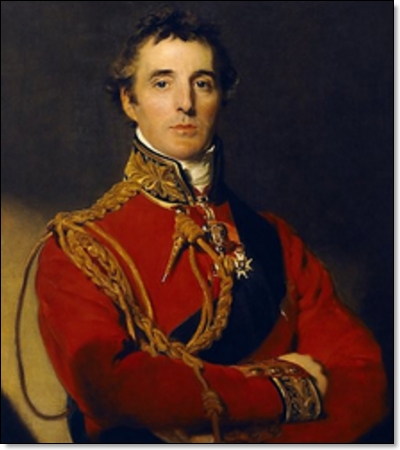Czar Alexander I of Russia
Napoleon's Former Ally Becomes His Greatest Adversary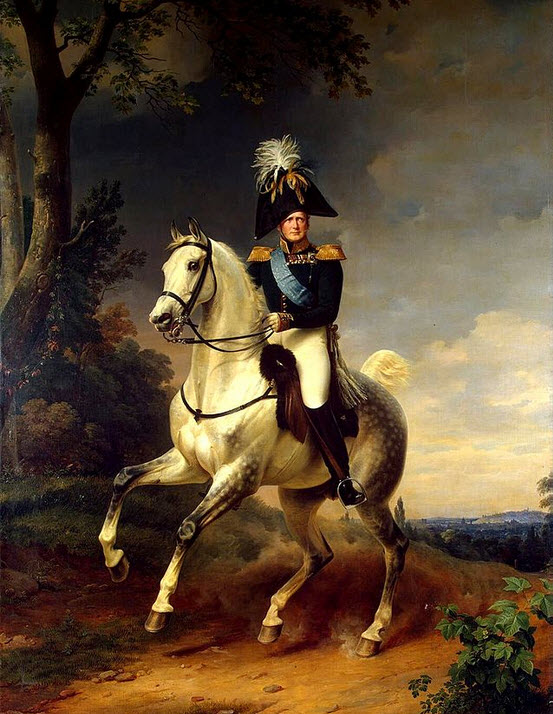
Czar Alexander I, Empeor of Russia (reigned 1801-25) is significant to the story of Emperor Napoleon because he led Russian resistance to the French invasion of Russia, and was instrumental in the French defeat. After Napoleon's retreat from Russia, Alexander pressed forward, through Poland and Germany and into France itself; at which point Napoleon was forced to abdicate for the first time. After Napoleon's restoration, and the resumption of hostilities, Alexander played an important role in the occupation of France.
Alexander the First was b. Dec. 23, 1777. His education, in which his father, Paul I., had no hand, was conducted by his grandmother, Catharine II., and col. Laharpe and other tutors. He always showed great affection for his mother, Maria, daughter of Eugene, duke of Wurtemberg. With a humane and benevolent disposition, the so called "northern Telemaque” was imbued by Laharpe with the enlightened principles of the age. Prof. Kraft instructed him in experimental physics, and Pallas in botany. It was thought better not to devote his attention to poetry and music, as it would have required too much time to make any great acquirements. In 1793 he married Elizabeth, daughter of Karl Ludwig, crown prince of Baden, and on the assassination of his father Paul (q.v.), on the 24th of March, 1801, succeeded him upon the throne. Although Alexander doubtless knew of the conspiracy to dethrone his father, there is no reason to believe that he contemplated the crime of murder. His accession was celebrated by Klopstock in an ode, To Humanity, indicative of the high expectations formed of him. The young ruler seemed deeply penetrated with a sense of his obligation to make his people happy and to promote their civilization and prosperity. He was the first to lay the foundation of the national culture and popular instruction on a regular plan, to introduce organization into the internal administration, unshackle the industry of the nation, raise the foreign commerce of Russia, and awaken in the people a feeling of unity and a spirit of patriotism.
Of specific internal improvements effected by Alexander, his exertions on behalf of the language, literature, and general culture of the Slavonic nations deserve special notice. Seven universities, at Dorpat, Kasan, Charkow, Moscow, Wilna, Warsaw, and St Petersburg, were either instituted or remodeled by him; 204 gymnasiums and normal schools, and above 2000 district elementary schools, were erected; and fresh life and activity given to the higher scientific institutions in St. Petersburg and Moscow.
Alexander the Reformer
He did more than any other sovereign in Europe for the spread of the Bible, by supporting the Bible society (which was suppressed, however, in 1826); and in 1820 he had a bishop instituted for the evangelical Lutheran church, and a general consistory in St. Petersburg for the whole empire. He devoted large sums to the printing of important works, such as Krusenstern’s Travels and Karamsin’s History of Russia, and prized and rewarded scientific merit both at home and abroad. Several scientific collections were purchased by him, and in 1818 he invited two orientalists, Demange and Charmoy, from Paris to St. Petersburg, to promote the study of the Arabic, Armenian, Persian, and Turkish languages. Young men of talent were sent to travel at his expense. By the ukase of 1816 he prepared the way for the abolition of slavery in the Baltic provinces; he also declared that no more gifts of peasants would be made on the crown-lands. As early as 1801 he had abolished the secret tribunal which is said to have extorted confession from political offenders by means of hunger and thirst. The practice of slitting the nose and branding, which had been customary in connection with knouting, was also done away with. Laws were enacted to prevent the abuses of power by governors. The privilege of the nobles, that their inherited property could not be confiscated as a punishment, was raised by him to a common right for all subjects; and much was done in composing a code of civil law. He promoted the manufactures and trade of the empire by amending the laws regarding debt and mortgages, and by the institution of an imperial bank, the construction of roads and canals, making Odessa a free port, and, above all, by the ukase of 1818, permitting all peasants in the empire to carry on manufactures, which was before only allowed to nobles and to merchants of the first and second guilds.
Alexander’s far-sighted policy with regard to the foreign commerce of Russia is shown in various expeditions round the world sent out by him; in the embassy to Persia in 1817, in which was the Frenchman Gradanne, who was acquainted with all the plans of Napoleon respecting India and Persia; in the missions to Cochin China and to Khiva; in the treaties with the United States, Brazil, and Spain ; in the naval and commercial treaties with the Ottomans; and in the settlement on the n.w. coast of America, in present day Alaska.
Alexander Breaks With Napoleon
Alexander’s foreign policy was characterized at the outset by a desire for peace ; in 1801 he concluded a convention putting an end to hostilities with England, and made peace with France and Spain. He next entered, along with France, into negotiations respecting the indemnification of the minor states in Germany and Italy, but soon discovered how little the French ruler intended any real compensation. As Bonaparte encroached more and more, took possession of Hanover, and annihilated Holland, Alexander broke with France, and joined the coalition of 1805. He was present at the battle of Austerlitz, when the allied armies of Austria and Russia were defeated, and retired with the remains of his forces into Russia, declining to enter into the treaty that followed. Next year he came forward as the ally of Prussia ; but after the disastrous battles of Eylau and Friedland, in 1807, he was obliged to conclude the peace of Tilsit, in which he managed to prevent the restoration of the kingdom of Poland, and to mitigate the hard fate of the king of Prussia. During the war with France, Alexander had also to carry on hostilities with Persia and with Turkey.
Dazzled by the fortune and genius of Napoleon, Alexander, in pursuance of the stipulations of Tilsit, acceded with his huge empire to the French continental system, thus altering entirely the foreign policy of Russia. He began by declaring war on England in 1808 and attacking her ally Sweden, wrested from that country, by the peace of Friedrichshamm (1809), the province of Finland. On the other hand, the Russian fleet, sent to the aid of the French at Lisbon, fell into the hands of the British. In the autumn of 1808, the two great potentates held a meeting at Erfurt, attended with great splendor, at which Alexander represented, as it were, the empire of the east of Europe, while Napoleon assumed the dominion of the west. In the war of France against Austria in 1809, Alexander took only a lukewarm part, although at the peace of Vienna he received the circle of Tarnopol as his share of the spoil of Galicia. Against the Ottoman Empire, which had not observed the armistice of Slobosta, he renewed the war, which was continued till the peace of Bucharest in 1812.
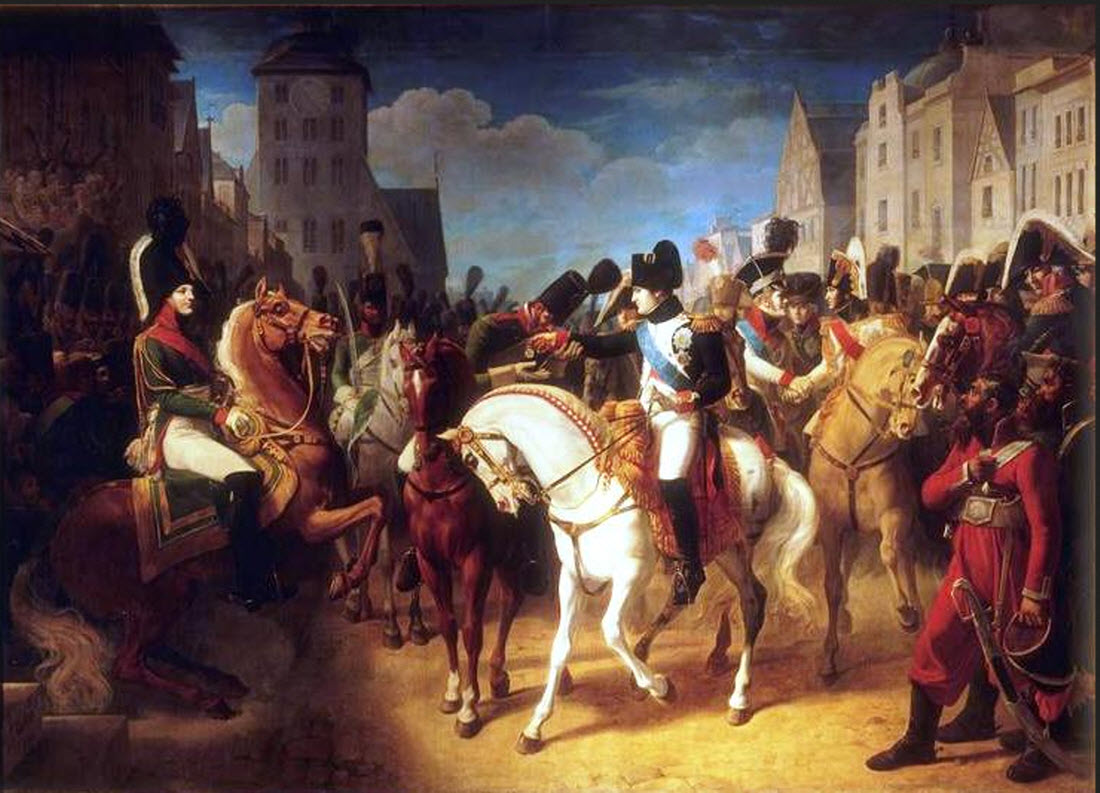
The alliance, however, of Alexander with the Napoleon involved such an inconsistency, and was so contrary to the real interests of Russia, that a rupture and a complete change of the Russian policy were inevitable. The pressure of the continental system on the material resources of Russia, the despotic changes made by Napoleon, the augmentation of the duchy of Warsaw, the proffers of alliance by England and Sweden, awoke in Alexander first discontent and aversion, and soon the thought of a decisive contest against the subjugator of Europe and the disturber of the peace of the world. When this gigantic struggle at last began (1812), Russia brought into the field an army of nearly 900,000 men. During this war (see Russo-German War), Alexander repeatedly exposed himself to personal danger, in order to fire the courage and patriotism of his troops. His magnanimity towards France after the taking of Paris facilitated the negotiations for peace, and won for him great personal regard, amounting to a kind of enthusiasm. He was received with the same reeling in London, which he visited after the treaty of Paris in June, 1814. When he returned to St. Petersburg, his first care was to provide for the wounded, and for the families of the soldiers that had fallen. The senate wished to give him the title of “ blessed, ” which, from Christian humility, he declined. After a short residence in his own capital, he repaired to the congress of Vienna. Here he laid claim to Poland as essential to the interests of Russia, but promised to confer on it a constitution, and, on the whole, appeared to act for the good of humanity and the freedom of nations.
Alexander and the Rreturn of Napoleon
In the return of Napoleon, Alexander saw the confusion of Europe begun again, and therefore urged the fulfillment of the treaty of Chaumont and the outlawry of the common enemy. His appearance in the French capital after the battle of Waterloo raised less enthusiasm than previously; yet on this occasion, too, France owed much to his generosity. It was about this time that the tendency of Alexander to pietism, fostered by intercourse with Madame Krudener (q.v.), was most strongly manifested, and exercised decided influence on his political views. It was under the influence of this religiosity that he founded so called the Holy Alliance (q.v.), the ostensible object of which was to make the principles of Christianity be recognized in the political arrangements of the world, but which became, in fact, a mere handle for political reaction.
In the end of Oct., 1815, Alexander returned to his own dominions. His policy, and the march of events, had completely changed the internal condition of Russia and her foreign relations. Her weight in European politics had become powerful; the limits of the empire had extended in all directions; and notwithstanding the war, the earlier legislative reforms had begun to act favorably on the industry and well-being of the nation. After 1805, Alexander had remodeled the army after the fashion of the western powers, and raised it to a condition that menaced Europe. When peace was attained, he not only sought to heal the wounds inflicted by the war, but to carry forward the work of reform formerly begun. Numerous administrative abuses were done away with, and the condition of the peasants was more and more alleviated. In 1816, the Jesuits, who were causing a great deal of disturbance, were made to leave St. Petersburg and Moscow, and in 1820 were sent out of the empire. On the other hand, proselytism was rigidly prohibited, and the Duchoborzes, a sect of the Russo-Greek church, were allowed the free exercise of worship.
Alexander after the Napoleonic Wars
But however good Alexander’s intention might be, his internal policy met with obstructions, partly arising from his personal views and character, partly from the nature of his position. Affected with a morbid religiosity, worn out and shaken perhaps in body and mind by the vast events in the vortex of which he had moved for the last ten years, the emperor became possessed of a dread of another European revolution; and the political struggles against reaction in Germany, and the outbreaks against despotism in Italy and Spain, appeared to him as the beginning of a new and terrible catastrophe. The attention now bestowed by Alexander on foreign relations threw internal improvements into the background: and the liberal reformer and pupil of Laharpe found himself involved in hopeless inconsistency, when he fully concurred in the policy of the Austrian cabinet, and, at the congresses of Troppau, Laybach, and Verona, helped to crush, along with the insurrections, the just requirements and political progress of the nations.
This complete reversal of policy could not fail to produce fruits, especially as Russia peculiarly abounded in fermentable materials. Poland saw itself completely disappointed in its national expectations, and required the actual carrying out of the promised constitution. The contact into which the Russians had come during the war with the civilization and institutions of the western nations, had excited in different classes of Russian society wishes and views by no means compatible with their condition at home. On the other hand, there had long existed in the most influential circles an Old-Russian party, who either found their interests hurt by the enlightened measures of the emperor, or saw in them the downfall of the national church, and of the nation itself. Besides, the army was kept up on the war-footing, and in 1821 numbered about 830,000 regular troops; and this pressed severely on the people, and produced discontent, along with exhaustion and disorder of the finances. To meet this evil, Alexander began the planting of military colonies, which, however, met with insuperable obstacles in the execution, and did not attain the end in view. But to exorcise the spirit of political discontent and the phantom of a Russian revolution, the emperor adopted the same measures that were very generally applied over the rest of Europe with similar views. The censorship of the press, and a rigid guard over the importation of books, were again introduced ; restrictions were put on science, literature, and education; inquiries instituted into all democratic movements ; mason-lodges and missionary societies suppressed; and gradually all plans for reform and progress given up. Over all the provinces of the empire, a net of police, open and secret, was spread, which interfered with the ordinary intercourse of society.
The experience that, in spite of this system of repression, public opinion could not be stifled, and that parties and individuals only expressed themselves more bitterly; the variance with his former self in which Alexander found himself involved; and the difficulties of governing the huge empire, which were now becoming more manifest and startling—all this tormented and embittered his morbid mind, and led him to complain of ingratitude and of a want of recognition of his good intentions. Sometimes he sought to forget his position in the dissipations of a splendid court, in which luxury and piety were strangely blended; at other times, he plunged into the darkness of religious mysticism. The progress of the revolt in Greece brought the policy of the emperor into complete opposition to public opinion and the most sacred sympathies of the nation. The Russian people, restrained from all participation in political movements, were profoundly affected by the religious element of the Greek struggle ; but the emperor condemned the rising as insurrection, disclaimed the favor he had formerly shown to the Greek cause, and confined himself to exhortations to the Porte to act with humanity. The death of his only and much-loved natural daughter, the terrible inundation suffered by 8t. Petersburg in 1824, in which he exposed himself to personal danger, and the alarm caused by a Russo-Polish conspiracy against all the members of the house of Romanow, contributed not a little to break the heart of the emperor, and completely destroy the composure of his mind. Sick in body, weary of life, and possessed by thoughts of death, he commenced, in Sept., 1825, a journey to the Crimea, with a view to benefit the health of the empress, who was ailing, and that he himself might enjoy retirement. Leaving the empress at Taganrog, he continued his journey, but was suddenly seized by a fever peculiar to the country, and obliged to return to Taganrog. Here, in spite of all care, he became worse, and died, Dec. 1, 1825. The rumor that he had been poisoned is altogether groundless. He is said to have learned, shortly before bis death, the details of the conspiracy which his brother and successor, Nicholas I. (q.v.), bad to begin his reign by putting down.—See Choiseul -Gouffier’s Memoires Historiques sur l'Empereur Alexandre et la Cour de Russie, Paris. 1829; and Alexander I.: His Life and Times, by C. Joyneville, London, 1875.
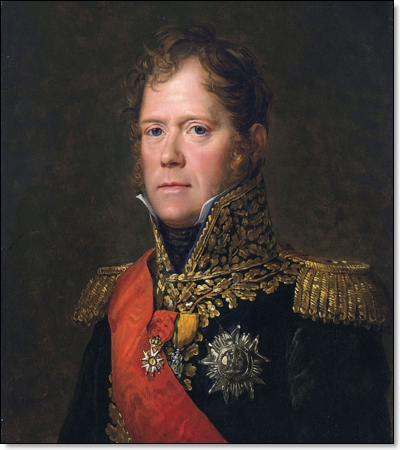
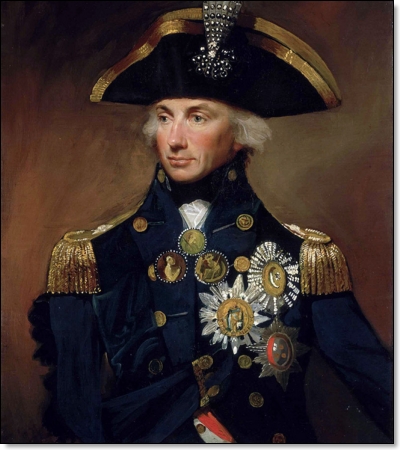
.jpg)
